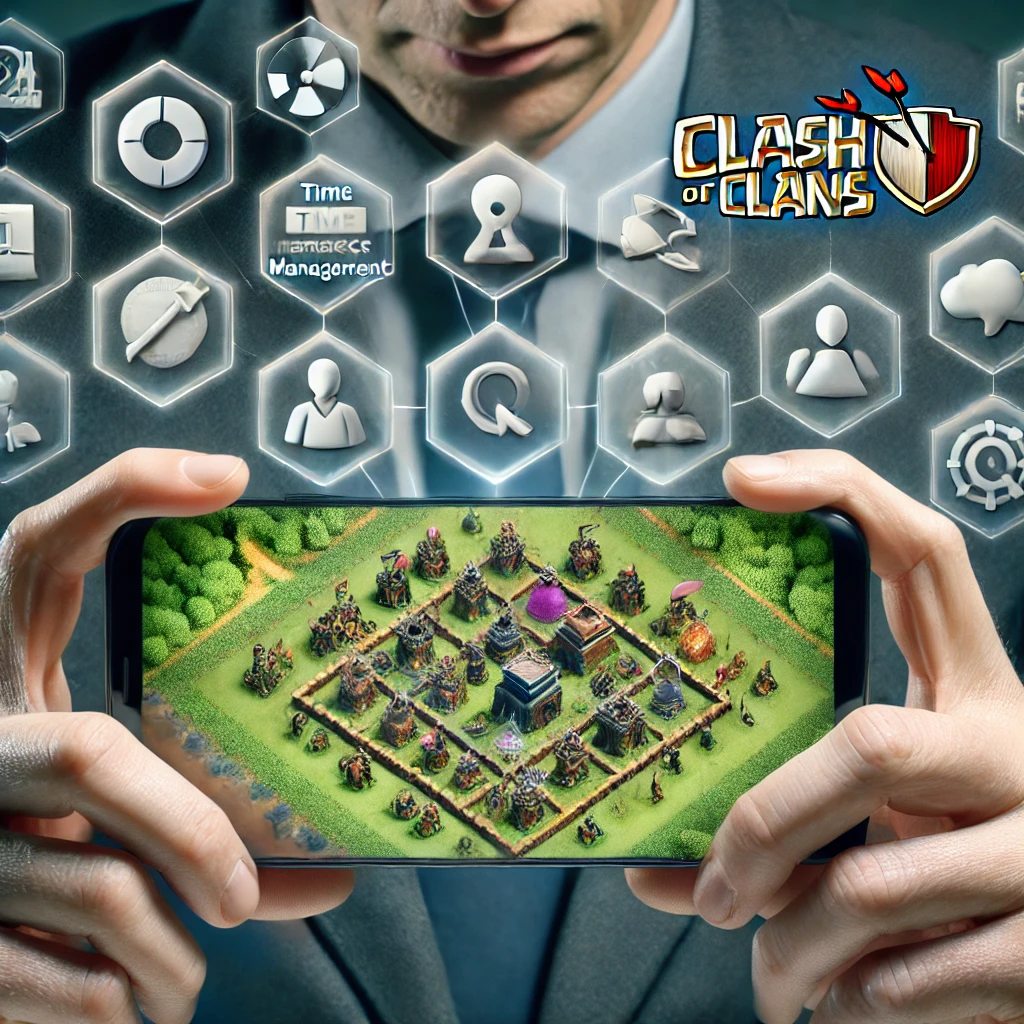
Natural Learning and Project Management Lessons from My Experience in Clash of Clans
Introduction: When I first downloaded Clash of Clans, I never thought it would be anything more than just a fun game to pass the time. Little did I know that this game, aside from being entertaining, would teach me valuable lessons in project management. As someone deeply interested in project management and having years of experience in the field, I’ve always looked for ways to improve my skills through daily experiences. For many, mobile games are just a quick break from reality, but for me, Clash of Clans became an unexpected classroom for practical project management. In this article, I want to share my personal experience of natural learning through Clash of Clans and how it helped me apply these lessons in real-life project management.

Is It Just Gaming or Learning?
Clash of Clans, at first glance, appears to be a simple strategy game. But the more I progressed, the more I realized it wasn’t just about building a village or attacking enemies. Every stage of the game required significant decision-making, resource management, and, simultaneously, balancing development with defense. This is exactly what we do in project management: allocate limited resources to different projects, prioritize tasks, and manage time effectively.
This game, in essence, felt like an ongoing project where planning and updates were required every day. Each decision altered the path of your village, much like how critical decisions in project management have long-term consequences.
1. Strategic Planning: My First Lesson from Clash of Clans
One of the first lessons I learned from the game was the importance of strategic planning. In Clash of Clans, you can’t succeed without having a solid, well-thought-out plan. Every action you take, from upgrading buildings to attacking other villages, must be part of a long-term strategy. For example, initially, you might want to upgrade all buildings and troops simultaneously, but you quickly realize that resources are limited, and you have to choose between upgrading either your buildings or your troops.
In the real world, managing complex projects requires the same level of careful planning. You need to determine which tasks take priority and how to manage the project’s limited resources efficiently. This was the first lesson I learned from Clash of Clans: without proper planning, your resources are wasted, and your project doesn’t move forward.
2. Resource Management: The Key to Success in Both Gaming and Real Life
In Clash of Clans, your main resources are gold, elixir, and dark elixir. Each of these resources plays a vital role in the growth and development of your village. What I quickly learned is that you can’t spend all your resources on just one thing. For example, you may be tempted to spend all your gold on upgrading a building, but at the same time, you need elixir to upgrade your troops. This is where I realized that managing the balance between wants and needs is critical.
In project management, you also deal with limited resources, such as budget, time, and manpower. One of the biggest challenges I’ve faced in managing projects is the allocation of resources to different tasks. The experience I gained from Clash of Clans helped me refine this skill in the real world. By better understanding the needs and priorities of the project, I was able to make better decisions when it came to resource allocation.
3. Prioritization: Making Critical Decisions on the Fly
Every stage in Clash of Clans forces you to make choices that require prioritization. For instance, you often have to decide whether to upgrade your defense buildings or your offensive troops first. Each choice you make can have a significant impact on the overall outcome of the game.
One of the most important aspects of project management is the ability to prioritize tasks. My experience in Clash of Clans taught me to always consider the current needs of the project and determine what will have the greatest impact in both the short and long term. This skill of prioritization has allowed me to better balance immediate needs with long-term goals in real-world projects.
4. Risk-Taking and Risk Analysis: High-Stakes Gaming
One of the most exciting aspects of Clash of Clans is attacking other villages. However, every attack carries a risk. Your troops may be wiped out, or you may not have enough resources to recover afterward. I learned that before launching any attack, I needed to carefully analyze whether I had enough resources, if the enemy’s defenses were too strong, and if it was worth waiting to build a stronger army first.
This lesson translates well into project management, where every new venture comes with its own set of risks. The ability to analyze and manage these risks can make the difference between success and failure. My experience with Clash of Clans sharpened my ability to evaluate potential risks and make more informed decisions before taking any major steps in real-life projects.
5. Time Management and Scheduling: A Key to Success
One of the challenges in Clash of Clans is the long time it takes to upgrade buildings and troops. Some upgrades can take hours, or even days, to complete. You need to plan carefully to manage these times effectively. When you’re trying to upgrade multiple buildings at once, you have to make sure you have enough resources and that their upgrade times don’t overlap.
In project management, time management is just as crucial. Each task needs to be completed within a specific timeframe, and overlapping tasks need to be carefully managed. My experience with Clash of Clans showed me how better time management and detailed planning could help ensure that projects are completed on time and with high quality.
6. Teamwork and Negotiation: Clans as Project Teams
One of the essential aspects of Clash of Clans is collaborating with other players through clans. I remember how important it was to coordinate with my clan members for group attacks and to agree on the best time for a collective effort. Teamwork plays a crucial role here, and without proper coordination, failure is almost inevitable.
This experience taught me the importance of collaboration and negotiation in the real world. In project management, without a coordinated and communicative team, success is difficult to achieve. You need to be able to interact with others, listen to their input, and come to a collective decision that benefits the project.
7. Flexibility and Strategy Adaptation: Facing Unpredictability
One of the key features of Clash of Clans is that nothing stays the same for long. Your village could be attacked at any moment, or your resources could run out unexpectedly. In such situations, you need to be quick in adapting your strategy and dealing with the new reality. The game taught me how to be flexible and adapt to unforeseen circumstances quickly.
This lesson is extremely valuable in project management. No project goes exactly as planned, and you need to be prepared to change direction quickly when issues arise. The ability to be flexible and manage changes is one of the most important skills for a project manager.
Conclusion: From Gaming to Reality
My experience with Clash of Clans showed me how natural learning through games and experiences can enhance management skills. From strategic planning and resource management to risk analysis and teamwork, all these lessons apply directly to real-life project management. Although Clash of Clans may seem like a simple game, if you look closely, you can extract valuable lessons for both life and work.
For me, Clash of Clans was not just a game but a practical course in project management. It helped me handle real-world project challenges better and strengthened my management skills. So next time you play, think about how you can apply these experiences to your real-life projects too!
Natural learning, also known as experiential learning, refers to the process of learning through direct experience, interaction with the environment, and facing real-world challenges. Unlike traditional learning methods that rely heavily on theory or books, natural learning focuses on practical, hands-on experiences where the individual actively participates in discovering and acquiring new skills or knowledge.
Here are some key features of natural learning:
- Direct Experience: Natural learning is based on real experiences. This means individuals learn by engaging with real-life situations, problems, and challenges, gaining skills through practice rather than just theoretical knowledge.
- Reflection and Thinking: Learning from experience isn’t complete without reflection. In natural learning, individuals think about their experiences, analyze what worked and what didn’t, and draw lessons from them to apply in future situations.
- Active Participation: Unlike passive learning (like just reading or listening), natural learning involves active participation. Whether it’s through playing a game, working on a project, or solving a problem, individuals are at the center of the learning process.
- Self-directed Learning: In natural learning, the learner often takes charge of the process. Instead of waiting for information to be provided, they actively seek out experiences and engage with them to learn.
Natural learning allows individuals to learn from their environment, mistakes, and practical experiences, making the knowledge gained more applicable and relevant to real-life situations. It’s a powerful way of learning because it combines doing, thinking, and reflecting to foster deep, lasting understanding.
